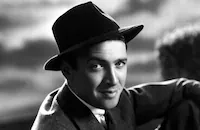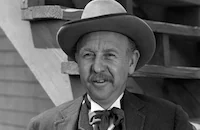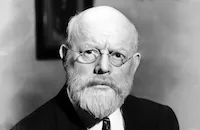Pot O' Gold

Brief Synopsis
Cast & Crew
George Marshall
James Stewart
Paulette Goddard
Horace Heidt
Charles Winninger
Mary Gordon
Film Details
Technical Specs

Synopsis
James Hamilton Haskell, second-generation owner of a struggling music store, is invited to go into business with his uncle, Charles J. Haskell, a wealthy health food magnate and sponsor of a weekly radio program, "Haskell's Happiness Hour." Unfortunately for C. J., who detests music, his factory is across the alley from the strong-willed Mom McCorkle's boardinghouse, which is currently home to Horace Heidt and his band. When debts force Jimmy to close his music store, he decides to take his uncle up on his offer, but along the way he meets Mom's pretty daughter Molly, a singer with Horace's band. While Molly is describing her family's longstanding feud with C. J., his employee, Jasper, shows up with the police and demands that the music stop. Jimmy lobs a tomato at Jasper, but it hits C. J. instead, and a delighted Mom rewards him with a free room. Later, Lt. Grady shows up and, after Molly credits Jimmy with the tomato attack, reluctantly arrests him. Judge Murray has just postponed the trial and released Jimmy on bail when C. J. barges into the courtroom, and Jimmy, afraid of being identified as a Haskell, sneaks out and ends up locked in a paddy wagon. The judge cites C. J. for contempt and sends him to jail, where he finds Jimmy entertaining the other prisoners with his harmonica. Upon his release, Jimmy learns that the band members pawned their instruments to post his bail. When C. J. gets out of jail that night, he is too hoarse to do his radio program, having been forced to participate in singalongs with his cellmates, so Jimmy fills in for him and is heard by Horace and Willie, Molly's brother. Later that night, Jimmy sneaks out of C. J.'s mansion and returns to the boardinghouse, where he is confronted by Willie and Horace. After Jimmy confesses that C. J. is his uncle and pays to get the band's instruments out of hock, Willie and Horace decide to help him by getting C. J. out of the way. Posing as a professor, Horace accompanies Jimmy to C. J.'s home, while the band hides in the furnace room and plays loudly. When Jimmy and the "professor" claim not to hear the music, C. J. decides to take a trip to Canada to rest his nerves. The next day, Jimmy calls on broadcasting executive J. K. Louderman and, after wresting control of the program from Jasper, arranges for Horace's band to perform on the next show. The broadcast is a big success, but the happy mood is broken when Jasper reveals Jimmy's identity to Molly. Feeling betrayed, Molly goes to the microphone and announces that, beginning with next week's broadcast, $1,000 will be given away during every show. C. J., who has been listening to the broadcast at a Canadian trading post, is apoplectic, and begins the long journey home. The next day, C. J.'s lawyer asks Jimmy to sign a statement declaring Molly responsible for the giveaway idea, knowing that a judgment against the McCorkles would enable C. J. to take their property, but Jimmy refuses. Louderman then arrives with Samson, a government official, who warns Jimmy that while he is legally obligated to give the money away, he may not use lotteries, raffles or contests to do so. Jimmy wracks his brain to figure out how to give the money away, and finally, on the night of the broadcast, the sound of the chiming clock gives him an idea. Using phone books from all over the country, Jimmy and Molly spin a carnival wheel to select the winner, Olaf Svenson of Minnesota. C. J. arrives as the broadcast is underway, and is about to call a halt to the proceedings when Louderman introduces him to two advertising men eager to buy the show. C. J. and Mom McCorkle bury the hatchet, and Jimmy announces over the air that he and Molly will soon be married.

Director

George Marshall
Cast

James Stewart

Paulette Goddard
Horace Heidt

Charles Winninger
Mary Gordon
Frank Melton
Jed Prouty

Charlie Arnt

Dick Hogan

James Burke
Donna Wood
Larry Cotton
Henry Roquemore
William Gould
Aldrich Bowker
Mary Ruth
Beverly Andre
Jay Ward
Claire Rochelle
Master Stan Worth
George Whalley

James Flavin
Virginia Carroll
Red Ferrington
Adele Smith
Max Ong
Paul White
Abe Dinovitch
Roy Lester
Jewell Mcgowan
Jerry Bowan
Ed Brady
Edgar Dearing
Nellie V. Nichols

Evelyn Dockson
Ray Hanson
Buddy Roosevelt
Bud Jamison
David Oliver
John Frank
Charles Mcavoy

Howard Mitchell
Ken Christy
Tommy Quinn

Nestor Paiva
Pat West
Paul Gustine
Mel Ruick
Carlos Fernando
Herbert Ashley

Eddie Gribbon
Freddie Walburn

Fern Emmett
Tim Ryan
Purnell Pratt
Harland Tucker
John Holland
Vic Potel
Jody Gilbert
Adolph Winninger
Crew
Basil Adlam
Andrew Bennison
Monte Brice
Robert Brilmayer
Howard Bristol
Larry Ceballos
Dudley Chambers
Fritz Collings
Mack David
Walter De Leon
Pete Decker
Frank Devol
Haydn Roth Evans
Lou Forbes
Lou Forbes
Dave Franklin
Hy Heath
Henry Henigson
Harry Jackson
Vee Lawnhurst
Helen Mccaffrey
Hal Mohr
Lloyd Nosler
Hans Peters
James Roosevelt
James Roosevelt
Fred Rose
Henry Russell
Helen Taylor
P. J. Townsend
Harry Tugend
William Tummel
Adolph Winninger

Photo Collections
Film Details
Technical Specs

Articles
Pot O'Gold
There are still some interesting reasons to take a look at the movie. Stewart's always worth watching, and here he even sings, for the second and final time in his career. (The first was Born to Dance, 1936.) Pot o' Gold also bears the name "Roosevelt" prominently in its credits. James Roosevelt, FDR's oldest son, had previously produced some short subjects, and Pot o' Gold was his first produced feature. It wound up being his only feature, as he soon left Hollywood to take part in WWII and later entered politics, serving as a Democratic Congressman from California. Stewart was under contract to MGM, and Roosevelt, making this film for United Artists, asked Louis B. Mayer for a loanout. Mayer, no dummy, plainly saw that Pot o' Gold wasn't exactly the best vehicle with which to capitalize on Stewart's newfound Oscar® heat. But he also knew the usefulness of having good relations with the Roosevelt family, and he agreed to loan his star. Though initially reluctant, Stewart too was ultimately charmed by Roosevelt into going along with the fledgling producer's debut film.
Pot o' Gold's title comes from an NBC radio program of the era in which $1000 was given away every week. The program featured the Horace Heidt Orchestra, who are third-billed in the movie. Stewart plays the owner of a music store who meets the daughter (Paulette Goddard) of a boarding house owner. She's as smitten with music as he is - especially with the Horace Heidt Orchestra, which rehearses at the boarding house. Stewart and Goddard concoct a plan to start a radio show featuring Heidt's band and promoting food products owned by Stewart's wealthy uncle.
Stewart and Goddard had never before worked together, and the studio publicists had a field day trying to generate the impression that there were sparks flying between the two. The truth was the polar opposite. Goddard thought Stewart too boyish, even though he had a reputation around Hollywood as a real ladies' man. She also dismissed his acting, saying "anyone can swallow." Stewart didn't think much of Goddard's talent either and said she had to fall back on a wisecracking tone to get by. In any event, there were definitely no romantic shenanigans going on after hours. (Besides, Goddard was at this time married to Charlie Chaplin.) Goddard is today remembered more for her stunning beauty than for her acting chops, but the fact is she was nominated for an Academy Award just two years after Pot o' Gold, for So Proudly We Hail! (1943).
The critics weren't kind to the picture. The New York Times found Goddard "pretty but rigid" and concluded that overall, "this Pot o' Gold is full of wooden nickels." A Boston reviewer was even harsher: "This picture proves that Jimmy Roosevelt can't produce, Jimmy Stewart can't sing and Horace Heidt can't act. George Marshall can direct, and keeps the pace lively, but this gifted director, with his finely tuned comic sense in other films, was wasting his time here. And MGM ought to be ashamed of itself, throwing its recent Oscar® winner to the dogs in this throwaway."
Immediately following Pot o' Gold, Stewart made the MGM musical Ziegfeld Girl (1941), this time in a non-singing role, and then was drafted by the army for WWII service, taking a five-year break from movie screens.
Art Carney makes his film debut here as a radio announcer.
Producer: James Roosevelt
Director: George Marshall
Screenplay: Haydn Roth Evans, Robert Brilmayer, Andrew Bennison, Monte Brice, Harry Tugend, Walter DeLeon
Cinematography: Harry Jackson, Hal Mohr
Film Editing: Lloyd Nosler
Art Direction: Hans Peters
Music: Louis Forbes, Hy Heath, Fred Rose
Cast: James Stewart (Jimmy Haskell), Paulette Goddard (Molly McCorkle), Horace Heidt (Himself), Charles Winninger (C.J. Haskell), Mary Gordon (Ma McCorkle), Frank Melton (Jasper Backus).
BW-86m.
by Jeremy Arnold

Pot O'Gold
Quotes
Trivia
Notes
The Pot O' Gold radio program, which paid a $1,000 prize to a randomly selected winner each week, first aired on NBC on September 26, 1939 and featured Horace Heidt and His Musical Knights, the same band that appeared in the film. The program was taken off the air in 1941, but it was revived for a season on ABC starting October 2, 1946. Hollywood Reporter news items include singer Mimi Cabanne and a six-woman vocal ensemble, The Singing Strings, in the cast, but their participation in the final film has not been confirmed. The film was scheduled to have its world premiere in Mexico City, as part of a film festival organized by producer James Roosevelt, but the event did not come off as planned, prompting Roosevelt to accuse the major studios of sabotage. The film was screened at the White House on 3 April 1941.
Roosevelt, the eldest son of President Franklin Roosevelt, spent two years as a vice-president with Samuel Goldwyn Productions before leaving to form his own company, Globe Productions. Pot O' Gold is the only film Roosevelt produced, however, before he was called to active military duty. After the war, he pursued other professional interests, and eventually became a six-term Democratic congressman from California.















